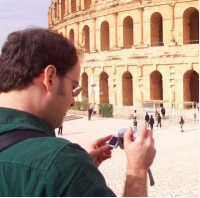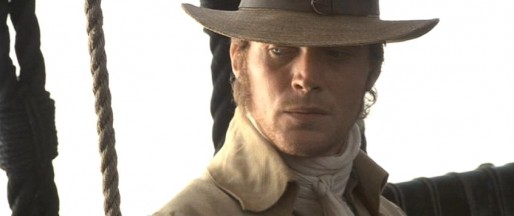 Curent Location: My office is in Washington, D.C., but I work wherever my laptop takes me.
Curent Location: My office is in Washington, D.C., but I work wherever my laptop takes me.
Current Gig: Senior strategist at NPR, which is a rather vague title. Easier to think of me as guinea pig-in-residence at NPR, currently embedded within North African and Middle Eastern social media communities to experiment with our Arab Spring coverage.
Member since: June 2009
Six-word memoir: I’m not a “social media guru.”
Favorite tech tool: A cooking timer I got from Williams Sonoma. It’s chrome and has three separate dials on it.
Favorite fictional character: Stephen Maturin from Patrick O’Brian’s Master and Commander series.
What happens during your average day?
Wake up; go online; eat at some point; go online again; spend a couple of hours with my family; back online; bed. And hopefully, at some point in the day, capture some amazing stories.
What project are you most proud of?
My involvement with the group Crisis Commons, organizing “crisis camps” around the world that brought together techies to develop tools for responders to the Haiti earthquake.
Why did you choose to get involved with online media?
I don’t remember it ever being a choice. It’s how I grew up. I remember the first time I went online was around 1984. A friend of mine had gotten a modem terminal for his bar mitzvah. It looked like a typewriter with two suction cups on the side, for your landline phone to plug into. It didn’t have a monitor; it used a thermal printer to display what would otherwise be on a screen. We used it to explore bulletin boards set up by NASA geeks in their spare time. Been online pretty much ever since, so it’s just a part of how I function.
How has the conversation about the digital divide shifted since you wrote this essay, and how has that impacted how we view the problem?
Back then, in the late ’90s/early 2000s, I worked on projects to bridge the digital divide, and tried to educate people that it wasn’t an Internet access issue per se, but one also about literacy and content. If you have access, skills and the ability to produce relevant content, you’ll have greater opportunities to compete, as well as participate in civil society. Even though I work at NPR now, I still feel like I’m playing my part encouraging people to improve their media literacy skills, their digital production skills, etc, but now in the context of covering the news, recording history and holding power to account.
What is the most difficult lesson you’ve learned about democracy (and how did you learn it)?
From 2003 to 2005, I spent a lot of my time working with civil society groups that participated in the UN’s World Summits for the Information Society (WSIS). The goal was to come up with the Internet equivalent of the human rights declaration, regarding things such as bridging the digital divide, online freedom, privacy and the like. Ultimately, not much came out of it – countries ended up bickering on how the Internet should be governed. Three years of work basically amounted to nothing.
Ironically, though, the work brought me to Tunisia on several occasions and introduced me to bloggers from North Africa and the Middle East, which positioned me to do the work I’m doing now.
You are one of the few people on Twitter who retweets others far more often than you speak. How does it feel to be a conduit (or, to some, an amplifier) of real-time revolution?
I don’t know what to call what I do. “Curating” seems to be a popular word, and I use it myself sometimes, but there’s something about the term that implies archiving information, saving it for future generations of researchers. Clearly that’s an important role, but it doesn’t capture the real-time nature of what I do. Some have referred to me as a type of DJ, grabbing samples of information and spinning them out for the world to experience. I think the job description is right, but given the seriousness of the topic I cover, I hesitate to use that too casually. Perhaps the best way to describe what I do is that I feel like a real-time oral historian, capturing bits of pieces of history while it’s happening, rather than piecing it together long after the fact. A lot of the stuff I retweet isn’t news per se, but snippets of emotion and conversation taking place among the people caught up in these revolutions. These snippets usually don’t result in “reporting,” but it’s certainly a type of storytelling that I feel is important.
If you had a million dollars dedicated to improving media, you would …
Organize an online campaign to get people and institutions to match that amount, then use it to create a media literacy and production initiative in some part of the world that is lacking both. I’d probably partner with groups like WITNESS, Global Voices Online, the International Center for Journalism, etc., to leverage their infrastructure and core competencies.

